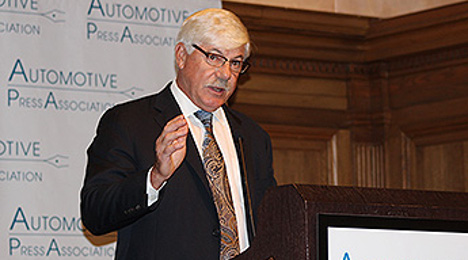NADA chair asks 4 questions about policies impacting financing & more

Chairman Jeff Carlson made NADA’s annual policy speech to the Automotive Press Association in Detroit this week. (Photo courtesy of NADA)
By subscribing, you agree to receive communications from Auto Remarketing and our partners in accordance with our Privacy Policy. We may share your information with select partners and sponsors who may contact you about their products and services. You may unsubscribe at any time.
DETROIT –
National Automobile Dealers Association chairman Jeff Carlson went back to the media this week in an effort to sound another warning to Washington, D.C., about implementing policies that would inadvertently make buying, financing, trading-in, and servicing vehicles harder and more expensive for consumers.
Carlson, in NADA’s annual policy speech to the Automotive Press Association in Detroit, illustrated a number of real-world examples of how decisions in Washington and elsewhere are leading to increased prices for consumers when they go to buy new vehicles, when consumers obtain financing for those vehicles, and when consumers go to trade-in older vehicles for newer, cleaner and safer cars and trucks.
Carlson asked the gathering a series of questions:
—If Washington wanted to implement a policy that would add $600 to the cost of financing a new car, what would you call that?
—What about a policy that would take anywhere from $1,200 to $6,000 out of a customer’s pocket when they went to trade-in a used vehicle in order to buy a new one?
—How about a policy that would add thousands of dollars to every single new vehicle that every manufacturer makes, up and down their entire lineups, right out of the gate?
Subscribe to Auto Remarketing to stay informed and stay ahead.
By subscribing, you agree to receive communications from Auto Remarketing and our partners in accordance with our Privacy Policy. We may share your information with select partners and sponsors who may contact you about their products and services. You may unsubscribe at any time.
—Or what if new-car buyers had to pay hundreds of dollars more at the retail level because Washington thought it was no longer beneficial to consumers to have multiple, independent retailers competing with each other for the same customers?
Carlson continued, “Leaving aside what Washington calls it, what would that feel like as a customer? Do you think that customer feels like they just got taxed? You’re darn right they do.”
Carlson — who is also the president of Glenwood Springs Ford and Glenwood Springs Subaru in Colorado, as well as Summit Ford in Silverthorne, Colorado — has been leading the efforts of franchised dealers to remind leaders in Washington that their policy objectives can’t be achieved if vehicles become too expensive for consumers to afford.
“NADA is in the business of telling Washington that they better get it right. And getting it right means keeping it affordable,” Carlson said. “So what NADA has said to leaders in Washington is that: We understand your goals, and we agree with many of your goals, but we cannot accomplish those goals on the backs of our customers.”
“What we’re doing is standing up for our customers, and helping Washington find a better way that protects our customers but still gets us across the policy goal line,” he went on to say.
To see Carlson’s complete remarks, go to this website.


